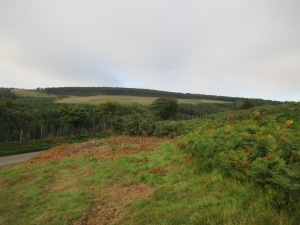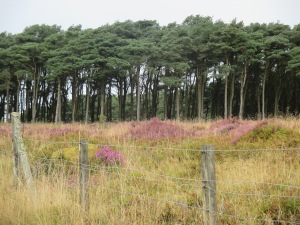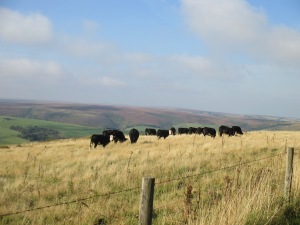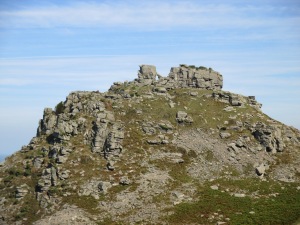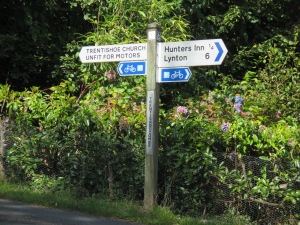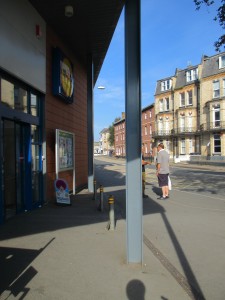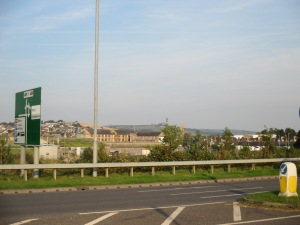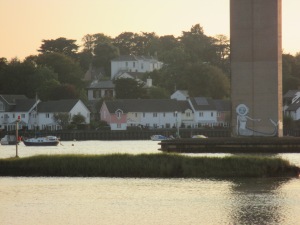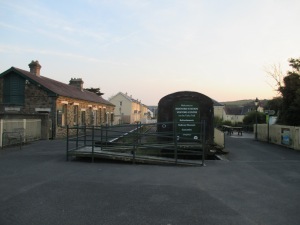‘I’d read something in the news, something I knew about, and I knew it was untrue. It gets you thinking, what about this other thing? What can you believe?’ – Tammy, over dinner, Weare Giffard.
Seasons change, sadly they must, and as I twist around in this thin little sack under a polythene sheet, camped out on some faraway hillside in the middle of nowhere, my mind’s pacing back to the journey that’s taken me here, and the good people I’ve met. Chaotic and times crazy, it’s true, but I wouldn’t’ve ever dared imagine that I’d encounter so many kind, wise and generous people. I’ve been fed, sheltered and watered by strangers. In the supermarkets and pubs, harbours and farms, community centres and chippies, and in so many little street corners we’ve talked politics and ethics, love and loss, friendship and family. And could I call all those people now friends? I think so. Everything I would’ve cynically ruled out as a possibility has instead been proven true. And all these people who’ve helped me have been modest, politely laughed, seeing it as just their nature, just the course of things. No bother! And I realise how common and wrong it is to underestimate our equals.
Three weeks are left of this journey. I took with me an unsuitable bicycle, two panniers full of unnecessities, and a body unfamiliar with anything more than ten miles’ cycling. I never expected that I would finish. That I lasted up to the Midlands was the biggest surprise. After that, I figured, perhaps it was possible…? And fuck yeah, I’m still here! Scotland, Wales and most of England is behind me. If I can do this, I’m sure any adult of sufficient physical health and naivety can too.
Autumn chills usher in memories of the past year. My life before I left feels so distant, delusively invested in countless superfluous projects and tasks. Up here on Exmoor with no other human for miles, there feels no rush to return back to all that. Yet we’re products of our past experiences, inhabiting our habits, treading the path of tradition that’s easier and better-signed. Some travellers will hitch to the ends of the earth in search of themselves, unaware that what they sought was in that desire which led them to shut the door on a past life and face the new. All it takes is a person or event in which it finally recognises itself in, like a mirror. Am I ready to go back to all that? I am incapable of doing anything else. In the meantime, there’s just the road. New friends and scenes await.
So I’m somewhere on Exmoor I figure, and at some point either last night I must’ve left behind Somerset and crossed into Devon. Rejoining the narrow farm-road from the Porlock Weir toll road, I cycle past rolling hills filled with sheep. The grassy verges are rich in wildflowers. To my right and let I pass groups of horses and plodding pheasants, and rock pippets squeak and plunge from hedgerow to hedgerow above me. The dust-trail rejoins the only proper read threading through Exmoor by the old hamlet of Culbone. I now ride along the A39, a dizzyingly high ridge that cuts a route through plunging and sweeping hills, with the aquamarine Atlantic gleaming gently to my right. Exmoor is majestic this morning. I forget to breathe as I ride besides verdant fields that rise from the earth’s core to the cusp of the skies. Birds of prey screech as they soar above the morning’s piffling traffic. Exmoor ponies graze in the distance besides cattle, chewing down the grass with the obsessive and burdensome attention of Sisyphus.
After cycling up at the level of the birds, the road crashes down Conisbury Hill to the village of Lynmouth. This small tourist settlement is cut into the foot of the mountains that make up this landscape. If plummeting down into it was terrifying, how on earth will I cycle back up out of it?
That fear’s put out to pasture as I wander around the small harbour, besides pretty pubs and pasty shops, Victorian boarding houses chickchocked into the hillside, beside trees and the flowing river Lyn. An Alpine scene. Its exposed location has seen it flooded from time to time, with many killed, but serenity’s the mood of the morning.
I wander by a small pebble seaside, buy some local honey for my couchsurfing host for the night, Tammy, and head into the visitor centre, where there’s an excellent exhibition of visitor’s poetry. Between bloody awful doggerel and verse worthy of Donne, I read ‘Save the goats! The goat in striped pyjamas’. There are attempts at capturing the majesty of Exmoor and the smallness of the human condition by comparison, and attempts to describe family relationships, pressed together and under pressure through cabin-fever familiarity on such holidays to quiet and dull places.
In search of an endangered goat, abetted by laziness, I take the Lynmouth cliff railway up to the top of the ridiculously steep mountain that links the village to Lynton, its sister settlement. It’s a fiver, but seems well worth the price of avoiding a mid-morning apoplexy. And rumour has it this is the second and last tough hill on the horizon, the final mountain on this journey.
Oh rumour, such bloody wrong rumours…
The carriage is filled with cheery holiday-makers. ‘Didn’t fancy the hill? No, I nearly died on up Porlock. I’m not a masochist!’ ‘I saw two walkers in Porlock trying to get to Combe Martin. You’ve got some stamina I said!’
Lynton is of a similar size and style. Chintz cafes offer cream teas, scones and Cornish pasties, whilst gift stores flog OS maps, cider and plastic-packet fudge. What is it about Englishness and images of green rolling hills, lightly farmed fields, oaks that appear alone at the centre of a moorland, herby smells from encircling woods, hedgerows that line the roads and blinker the path ahead, a gentle sun that rarely burns the skin? A myth that my experiences have actually proven real. These places are real, but you won’t find them on your satnav or by a railway station. They are in-between, and will not be found by looking.
I refuel at Ethel Braithwaite’s. ‘Have a nice day’, I utter unthinkingly as I leave. ‘How can I not when I live here?’ Outside, local traders are gathered in a corner and complain loudly about local taxes. No haven feels permanent. Surrounded by such beauty, they speak with the same rancor and miserliness one might hear in Morden, Morningside or Moseley.
The road plunges down from Lynton. It’s a fine morning to take a detour, so I head down towards the Valley of the Rocks. This dramatic valley merits its impressive name. A wonder of nature! Just imagine what series of random coincidences of nature produced these great pyramids of dry stone that now rest against the blue sea-sky horizon. ‘The very bodies and skeletons of the earth’, imagined Robert Southey. This place has inspired countless poets, painters and musicians. The rocks tumble one upon another, asleep, surrounded by thick bracken and groups of hikers.
This westward way is lovely, winding and silent, cutting by Lee Abbey and a ridiculously threatening toll road operated by a shameless Christian group, then through a series of beautiful forests and bays, but a warning: it is steep, bloody steep. It doesn’t get easier. Porlock Hill replays itself with exhausting alacrity. At times I’m huffing at the same speed as hikers. A northern couple keep up with me, half-playingly at each other’s throats as they contest each other’s interpretation of their OS map. I am about to tumble down a road that would’ve led, after several miles, nowhere, but luckily they shout me to the right direction. The roads here are so narrow they no longer appear on Google Maps, but with second-guessing the trail eventually reaches Martinhoe, a sleepy hamlet at the top of this rising series of peaks, before dizzyingly dropping down to Hunter’s Inn, where retired couples sip chardonnay and lager as they lunch in these lovely environs.
The North Devon landscape is rapidly wearing me out. Nothing is level: the entire landscape has been folded into a continual series of Ws. Woah! At times these heights are perpendicular. I’m genuinely terrified at the speeds I pick up as I race down towards Hunter’s Inn, and demoralised in equal measure. For what does this insane plunge mean? One covers in thirty seconds what one must then spend thirty minutes cycling up again. It replays again and again, through one village after another, down into tourist towns like Combe Martin that terminate with a harbour and a beach, then pique back to peak. At points I’m pushing the bike back up. But it’s worth it, to pass along these teeny narrow roads off the map, through dense and pretty woods where the sun flits through the branches and casts a million kaleidoscopic shadows against mossy trunks and beds of wildflowers. Swallows, sparrows and starlings play in the fields about me.
Ilfracombe appears after Hele Bay, a small harbour and beach with a few houses, akin to Combe Martin. Over another hill, this large Victorian seaside resort spills down a hillside into a harbour. There’s a parade of local gift shops and restaurants. I cycle down the old narrow Fore Street and past a few similar looking pubs. I’m dreaming of a place that sells pizza, but it’s all fish and chips, tandooris and overpriced sandwiches. So, besides the seaside, I have chips for the zillionth day in a row and talk to the shop-owners. One man confuses my line of questioning as seeking work, and directs me to a pub. He’s come from Lanzarote and has been here five weeks after his girlfriend got a job. The blisters on his hands reveal he’s still getting used to frying chips.
I pop into the Pier Inn, hoping to drink some locally-brewed Wizard beers, but they’re all out. Sipping some alternative blandness, I watch the tourists mill up and down by the harbour, by a huge bronze statue of a pregnant woman hoisting high a sword, pretentiously titled ‘Verity’ by artist-entrepreneur Damien Hirst. A large guy from Cirencester sits beside me and manages to mishear most of what’s said, in a tawdry comedy of errors.
Ilfracombe is charmless, but it is not cheerless or crap. Take a look around, and there is enough to see and do. There are the two termite hives of the Landmark Theatre, and besides the harbour is old St. Nicholas chapel, still in use as a lighthouse since 1320. Good old-fashioned jollies are on offer, though today few are buying except out of habit or nostalgia. Beyond the limp if expensive efforts at reinvention through the statue and theatre, Ilfracombe is as it was, and that’s no bad thing. Morecombe’s gone out of business, and Blackpool is now godawful. Forgive the fustiness and mustiness if you can, and stop by for this rare surviving enclave of the Great British seaside.
I pause by the shore. Lundy Island lies somewhere in the distance, now the stuff of pleasure trips but once a den of nefarious British pirates. Some families still make a living from fishing, though more are now employed in various services. I pick up supplies and stories at the local Lidl. Discount supermarkets are where the community’s at! I get the sense of a small but not close-knit town, and of a county which does not recognise itself. Though it’s Devon, everywhere offers Cornish pasties and fudge. There’s a reluctance to trade on its virtues. It seems oblivious of its own natural wonders. Lidl’s a little more reassuring. It does not heavily promote multi-buy discounts on chocolate, crisps, biscuits and booze as the major supermarkets do, the very things now causing major health problems that disproportionately impact those on low incomes. Want a bargain? Buy more than you need. Eventually one becomes dependent on larger portions.
Food tells us about class, and malnutrition remains the lot of the poor. But now the stakes are turned from deprivation to excess. As diabetes, obesity and attention disorders soar globally, the major supermarkets and multinational food companies profit. Cheap crap food, cheap crap news, cheap crap housing. There are so many St. George and Union Jack flags around here. Why, and for what purpose? I’m tempted to start knocking on doors, but decide against it. But from passing conversation, local opinions evidence an unthinking adherence to the partisan views of right-wing news.
I think back to what Andy said in Bridgwater. Beneath an ideology of multiculturalism and equal opportunities, men and women and peoples of all nationalities are now united in a shared precarity. Low pay and zero hours for all. To stall any collective action, older workers have retained some of their pensions and privileges whilst younger workers enter with nothing. Overseas workers who power much of the core infrastructure of the country, from farming to care homes, from A&E doctors to electricians and plumbers, are scapegoated for this insecure labour market. Read the financial pages, where business leaders call for more tax-breaks and cuts to employee regulation. It depresses me that in a country with a remarkable history of people’s protests, democracy, toleration and liberalism, so many of the English just aren’t putting two and two together, in the way so many Scots have.
What of another model, reorganising our overstretched and incoherent education system to create a highly-skilled workforce, one capable of producing high-tech goods and services, most for export? Industries could be re-established from the proceeds through a tax on wealthy property owners and businesses, matched by a decisive closure of British tax loopholes. Publicly-owned and invested in, they’d become the vehicle for a programme of full employment through living-wage paying apprenticeships for the young and long-term unemployed. And the social problem of idleness (I say this only half-ironically) could be tackled by the mandatory requirement of at least one day per week given to training and study.
Ah, back to the seventies, we know how that ended up!, a reader replies. Yes. Publicly-owned lame-duck companies still own most of this country’s infrastructure, except now they’re French, German, Spanish, Chinese, etc. But this would drive out the wealth-producers and plunge the country into 3rd world poverty, says another. You mean those non-domiciles who pay no taxes, pay their workers a poverty wage and whose profits disappear out of the UK and into some offshore haven? I see no problem with losing them. But this would allow capitalist exploitation to continue in new form. Explain to me how a modern developed country could remain socially stable without a similarly organised division of labour on which it has been based? The prospect of a Communist uprising, as likely in this place and moment as the Second Coming, would be overwhelmingly defeated by superior military power and a corresponding installation of a far-right government. Someone must produce the tea-leaves, cheque shirts, cannabis and Macbooks through which such post-capitalist speculation is conducted. I feel we need to start thinking more pragmatically and constructively about new social models that meet the immediate needs of the present and the future.
I cycle out of Ilfracombe and into the delightful North Devonshire countryside. The roads are becoming flatter and more bearable, though this September sun is so unseasonally hot that I’m just dripping in sweat. At Braunton I come off the road and join a cycle-route over an old railway route. This is the Tarka trail, a well-signed and designed route of around thirty miles that cuts through the gentle wildernesses described in Henry Williamson’s literary portrait of an otter. I pass Barnstaple, a town with similar problems to Bridgwater, left behind by the loss of its industries and cut adrift by the decline of the railways. Chain stores and light industry, underlined by the public sector. This was once a hub of holidaymakers travelling across the country for their seaside holidays in Lynton and Ilfracombe, but these days Fethiye and Fuerteventura are cheaper and promise more consistent weather. Barnstaple rusts in the distance, and for a change I decide to avoid the local town to spend more time in its prettier countryside.
The cycle trail cuts through marshy levels, and above soar military helicopters from the nearby royal marine base. It reminds me of the surprisingly large presence of the Ministry of Defence all across the countryside, in a way that feels hidden from city-dwellers. They own far more land and possess far more power than one would give credit for. What are they protecting? The wildness of this trail to Bideford is further enhanced by the number of ruins along the route, from graffitied shelters to the wreck of an old vessel, a motif for a certain moment in one’s life, wrecked internally but still tethered to the shore.
I pass through Instow with the pretty seaside town of Appledore bobbing in the distance. I come to Bideford, a small town straddling the river Torridge. This was once one of England’s major ports. Walter Raleigh landed his first shipment of tobacco here, a key historical moment for anyone who today still enjoys a smoke, and the genteel river here was once clogged with traffic. Henry VIII’s obsessive cartographer John Leland passed through here on his exhaustive journeys across England. Bideford he described as ‘a praty quik streat of smithes and other occupiers for ship crafte’. Leland was determined to see and annotate everything, so much so that the infinite task eventually drove him insane. One feels just a tang of the mania and desperation of his labours in this letter to the king:
‘In so muche that all my other occupacyons intermitted, I have so traveled in your domynions both by the see coastes and the myddle partes, sparynge neyther labour nor costs by the space of these vi. yeares past, that there is almost neyther cape nor baye, haven, creke or pere, ryver or confluence of ryvers, breches, washes, lakes, hethes, forestes, woodes, cyties, burges, castles, pryncypall manor places, monasteryes, and colleges, but I have seane them, and noted in so doynge a whole worlde of thynges very memorable.’
Poor John Leland! He crossed and re-crossed locations across the country again and again, amassing notes upon notes. He never drew anything, nor had any assistant. Instead he mapped the country in words, layering observation upon observation, producing far too much material and so contradictory as to be of little use to anyone. There are times when I feel that pain and fatigue…
Tammy lives just outside Barnstaple in a village with the name of Weare Giffard, ripe as the title for a short-lived boyband. It’s situated in a peaceful valley where cows stroll besides a thin river, and an evening sun casts gold and mauve colours across a sleepy string of houses. I meet Tammy, who has nicely offered to host me via Couchsurfing. She’s a gardener and grew up not far from this place, closer to the border with Cornwall. ‘I’ve always been a country girl’, and has thought about living in cities but prefers the slower pace here. ‘Falmouth’s the biggest place I’ve lived in!’
She tells me about Cornwall and Devon over OS maps, and of places that I should look out for on my trip. From what I discover, there are some truly wonderful places awaiting me over the next few days. We eat cooked vegetables and rice, a good filling meal, whilst Tammy tells me about the valerium that grows easily here, and about this old cottage where our man Henry Williamson would visit and play piano. The house has a pleasant musty old smell and the walls are in some disrepair, but that and the old well-used furniture and wacky colour scheme add to the aura of genteel decay. I feel like I have occupied the home and personality of a very old eccentric, and I suspect I have. Tammy has only lived here a short time and has chosen to leave the house in its original state. In peaceful North Devon, such genteel eccentricity feels not only feasible, but indeed the norm.

